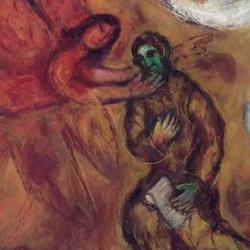Isaiah 24:7-8 consists of six clauses, each of which begins with a verb, most of them verbs of lamentation:
“mourns the wine,
languishes the vine,
sighs all joyful-hearted
ceases mirth of tabrets
ends noise of rejoicers
ceases joy of the harp.”
The parallel clauses highlights the links between wine, vine, and joyful-hearted people on the one hand, instruments and people on the other. People are vines; joyful people are vines full of groups and producing wine. People are musical instruments; joyful people produce songs of praise, while those in pain sing laments.
This is another example, too, of a numerical structure in Isaiah 24. Six clauses describe the elimination of revelry and joy from the land, a sixfold lamentation that never ends in Sabbath rest or joy. On the other hand, the verb shabat (cease) is used twice. There is a kind of Sabbath, a rest from joy not a rest in joy; there is a kind of ceasing, but it’s a cessation of all that makes the Sabbath sabbatical. Sabbaths cease; Sabbath on sabbatical.










